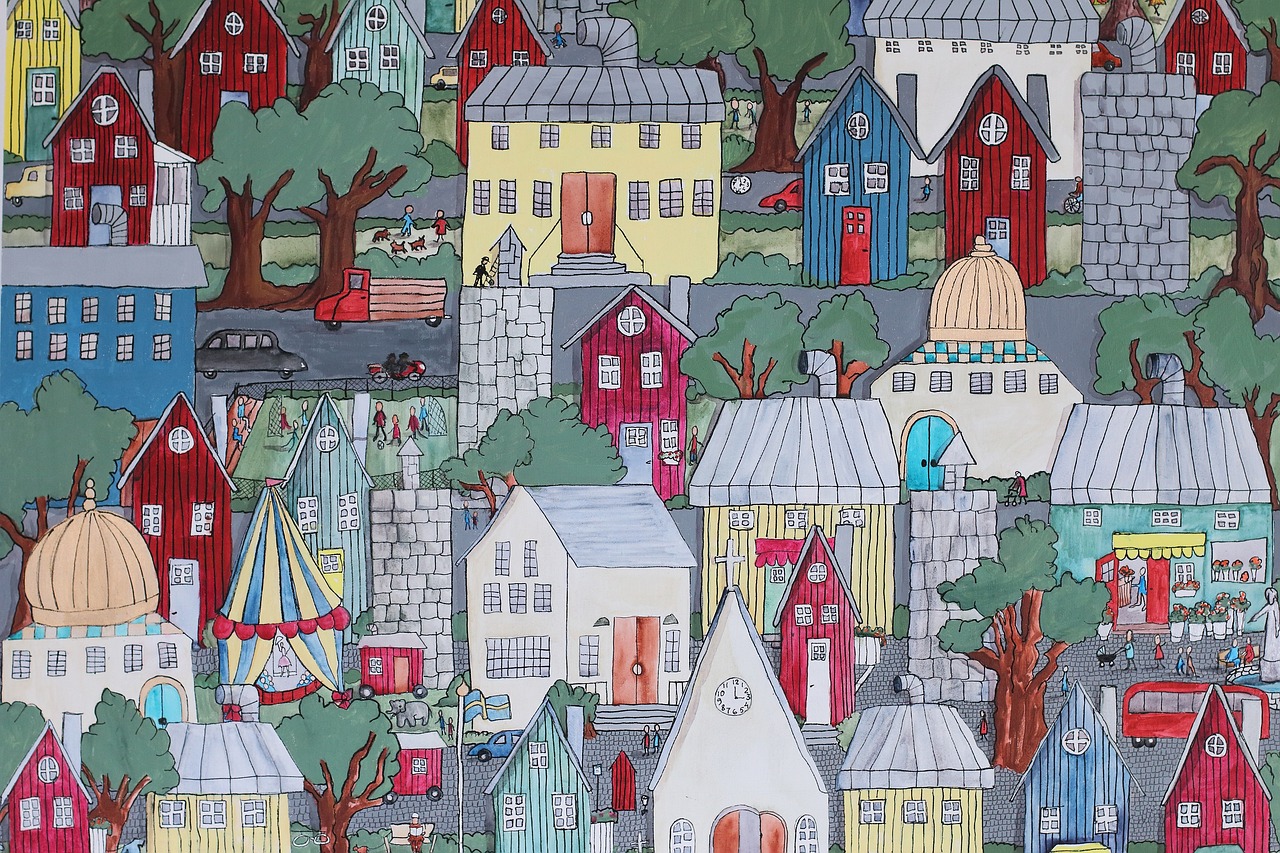On The Advice of the Bicycle Man
– Fiction by Harrison Kim –
Featured in issue 16 of Dreamers Magazine

Shig Sagimoto appears to me in one short image, a slim, fedora-hatted old fellow on a bicycle coasting down Carlin Hill, both hands on the handlebars. As I observe him, he raises one arm upright into the blue sky of summer, then holds down the top of his hat, and for a few slight seconds, holds high his other hand, and balances as his bike wheels fly downhill through the torpid afternoon air. Then, he sees I’m watching. Both hands press back to the handlebars, and he moves his head down, glancing away as he pedals into the Tappen Esso parking lot.
Back in the nineteen-seventies, everyone knew him as the “bicycle man” of Tappen Creek, a Japanese Canadian who lived alone in a cabin on the old Calhoun Place, his home since the internment phase of World War Two. Shig spoke very little English and avoided personal contact. His brown face shone all wrinkly from the sun, his legs bowed in a wiry way. Whenever the school bus passed as he searched for bottles at the side of the highway, he adjusted his battered fedora to fit lower over his eyes. I’d watch from the windows and wonder “Could he give me some good advice?”
“Leave him alone, Harrison” school bus driver Reinhart Pikker said. “That’s what he wants.”
“I think he might be wise,” I told him. “He has a lot of time to think.”
“He’s like a child,” Pikker continued. “The only way to become wise is to know other people.”
Pikker, a sharp featured man who wore a black cowboy hat, served in the German Navy during World War Two. His U Boat was captured in the Caribbean, and he spent the war at an internment camp in Arizona. Afterwards, he immigrated to Canada and worked at various farm jobs in the area, just like Shig. He learned English and acquired a Class 2 drivers’ license. The school bus kids called him “The German.” I liked sitting across from him because he didn’t dis me like they did.
“You’re ugly, Harrison,” they chanted in my face. “You think you’re good-looking, but you’ve got a real crooked nose….”
“You’re wearing your pajama top,” added Sandy H., a wide-faced girl with a loud voice. “Why do you talk so much to the German?”
“I like his accent,” I said, then looked down to see the tell-tale stripes of my night wear.
“Wake up, Harrison! You’re not in bed anymore!” Sandy cackled.
I lived in a whirl of daydreams. My favorite fantasy was being the only person alive after the end of the world, except for Sandy’s quiet friend, Connie C., who sat at the back of the bus, showing her perfect high-cheek profile as she stared out the window. I dreamed of starting the world over with her, spent whole evenings imagining how it would be.
“What do you think of the two-wheeler man?” I asked Connie, as the bus overtook Shig, pedalling over the gravel at the side of the road, head down, bags of cans held fast to the bike with bungee cords.
She didn’t answer for a moment. Then she turned her head and said, “Why does he want to be so lonely?”
She gazed at me with wide green eyes. I looked past her, at Shig left behind in the distance, and said nothing.
Sandy giggled. “You’re going to be alone the rest of your life.”
I understood then why Shig might want to keep his eyes down. I wanted to build a cabin on the mountain, stay up there and dream. Maybe being alone in my dreams was better than real life.
“Has anyone ever given you a flower?” I said to Sandy.
* * * *
One Saturday afternoon, my friend Ellis and his sidekick Fowler walked into Shig’s home.
“We didn’t have to break in. The door was wide open,” Ellis told me. “I think Shig’s got a bad memory.”
“What did his place look like?” I asked.
“Retro,” Fowler said. He laughed. “Clothes hanging on a washing line above the kitchen sink. Clean, though. The guy’s a neat freak. We opened his fridge and took a bunch of cheese.”
“He makes his own,” said Ellis. “The whole place smelled like it.”
“The last Japanese didn’t surrender until 1974,” Fowler continued. “They kept fighting on these remote Pacific Islands.”
“Why did you steal his cheese?” I asked.
“We had to take something,” said Fowler. “Otherwise, what would be the point?”
“My mom knew him. Back when she was a kid.” Ellis said. “Do you want to go check out his place?”
“I’m going to build a cabin on the mountain,” I told them.
“Are you pissed off at us?” Ellis asked.
“I think you should take that cheese back,” I said.
Fowler laughed. “It’s in my stomach,” he told me. “I don’t get food like that at home.”
The more I ruminated about Fowler and Ellis, the better the cabin idea sounded.
“Now I know why Shig doesn’t talk to anyone,” I thought.
The next day, I borrowed my dad’s axe and headed up the mountain, to build my own personal shelter.
Not long after, Fowler walked into Shig’s place a second time and stole a rifle. Apparently, he’d scoped it out on the previous raid. Fowler shoved the gun under his coat and down the side of his pants and walked stiff legged up the road. Farmer Calhoun caught him stepping funny with the barrel sticking out the top of his shirt and called the police. I didn’t see Fowler around much after that.
“The Judge told Fowler if he joined the army he wouldn’t go to jail.” Ellis said as he tinkled away at the school piano. “Maybe he’ll end up doing peace keeping in Cyprus, like my dad.”
“I guess he’s eighteen,” I nodded. “Old enough to join.”
“He was breaking into places all over the valley,” said Ellis.
“That guy always made me nervous” I said. “Why did he do that?”
Ellis played a few bars of “Wipeout.”
“Thrills,” he answered. He grinned. “You and I can be better friends now.”
“I’m not going to break into any houses,” I said.
“We could play music,” he offered.
I beat the drums in a rudimentary way. Ellis had listened to me on a few occasions, but I didn’t believe he thought I was any good.
“Maybe we could form a band,” Ellis upped the ante.
“I’ll think about it,” I said.
By this time, I’d almost constructed my refuge on the mountain. It was more like a lean-to, but I could fit inside. I tried camping there overnight. I didn’t like looking up at the closed-in roof. I lay out under the stars and stared up at the trees and the sky until morning. I wondered how Shig could live by himself in his small wooden shack.
“Did you even see a bathroom at his place?” I asked Ellis.
He looked up from the piano. “It’s all kind of a blur,” he told me. “Fowler used the John. He said he always used the John when he broke in somewhere.”
“Aren’t you part Japanese?” I asked. “You said your mom knew about Shig.”
“She moved up from the coast during the war,” he said. “With my grandparents. She was only eight years old. Shig was already working at Calhoun’s farm back then. He didn’t talk much to anyone, even to her.”
“I guess he didn’t tell her any of his secrets,” I said.
Ellis laughed. “Maybe his biggest secret is that home-made cheese.”
Then he played “Green Onions” on the piano for about five minutes. I started drumming the bongos. The rhythm took me in. I grinned at Ellis.
“Sounded not bad,” he said, after we finished the song.
“Let’s do another one,” I told him
The next day, I stepped on the bus with that same rhythm beating through my head. The sound lifted my mood, helped me say “Hi,” to Pikker.
“You’re feeling good this morning,” Pikker noted.
He gave me a big grin and stepped on the gas.
Shig wobbled his bike across the Tappen bridge on the road ahead of us.
“It’s tough being alone,” I said.
“I live with it,” Pikker told me.
“Why don’t you get married?” I asked.
Pikker shrugged. “Never met the right woman,” he said, “Or one that could stand me.”
Shig took off down a side path.
“Maybe you and that guy could be friends,” I offered.
Pikker shook his head.
“We’ve got nothing in common,” he told me. “He wasn’t even in the war.”
****
After school, Ellis and I hiked along the railway tracks and over the hill to Shig’s place. Strange, droning music came out the open window. We crept up and peered in. A record spun around an old playing machine as the music quavered out. I ducked, then raised my head again and Shig’s eyes peered at me from the other side.
“This is for you!” Ellis said and pushed a few packages of cheese through the window, along with the note we’d written, “I hope you like our gift. Sorry to have disturbed you.”
Shig pulled the curtains shut.
“Maybe he’s going to get his gun,” I said.
“We best be out of here,” Ellis told me, and we ran off towards the railway tracks.
****
I saw Shig a few days later, coasting down the hill to the Tappen Esso parking lot. He laid his bike against the station sign and moved towards me. I never perceived him as so short, bony, and wizened. He stepped up quickly. I saw his cheekbones working. I crouched down behind my bike. His voice sounded barely louder than the swoosh of the passing cars, out of practice, a rough whisper.
“Stop watching me,” he said. “Stay out of my dreams.”
“Is that your advice?” I asked. “I always wanted to know your advice.”
“Stay out of my dreams,” he repeated. “Keep to your own world.”
He stepped away, holding his hat down with one hand. He kneeled and lifted his bicycle, hoisted his leg over the bar and stood there a moment, staring over at the trees across the highway.
I remembered what Pikker said “The only way to become wise is to know other people.”
I stayed crouched behind my bicycle.
Shig looked back once, above my head, at the mountain, or the clouds. Then he pedalled off along the gravel at the side of the road.
“I just wanted to know you,” I shouted as he wobbled away.
****
“Some people want to be left alone,” I told Pikker as I stepped on the bus the next day.
He grinned and steered the vehicle out onto the road. “Nice shirt,” he said.
I wore normal clothing, the right way around. I’d brushed my teeth. My packsack sat on my back, straight and freshly washed. Before the bus arrived, I’d picked a dandelion flower and a wild rose from beside the bus stop. I held the flowers, one in each hand as I walked to Connie’s seat and sat down beside her.
“You’re bold this morning,” she told me.
She pulled her hair to one side, and bent her head slightly, showed the side of her cheek. The edge of her ear poked out a bit. The sun shone in through the window.
I passed the dandelion to Sandy, sitting with her feet propped up on the seat across from Connie. She grimaced, flung the flower aside.
“I’m not into weeds, Harrison,” she said.
“One day, Sandy” I said, “I hope you’ll appreciate this moment.”
I passed Connie the rose.
“I’m starting the world over,” I told her. “This is for you.”

About the Author – Harrison Kim
I live and write out of Victoria, Canada, and grew up in the BC Interior, where I knew the actual bicycle man, who lived by himself in a small cabin in the country. My stories have been published in Blue Lake Review, The Horror Zine, Fiction on the Web, Hobart, X Ray Literary Magazine, Bewildering Stories, Literally Stories, Liquid Imagination and others. Please visit harrisonkim1.blogspot.com
Read More Creative Writing
Meanwhile, at Dreamers…
2024 Micro Nonfiction Story Writing Contest Results

Congratulations to the winners of the 2024 Dreamers Micro Nonfiction Story Writing Contest, for nonfiction stories between 100-300 words.
2024 Place and Home Contest Results

Congratulations to the winners of the Dreamers 2024 Place and Home Contest, based on the theme of migration, place & home.